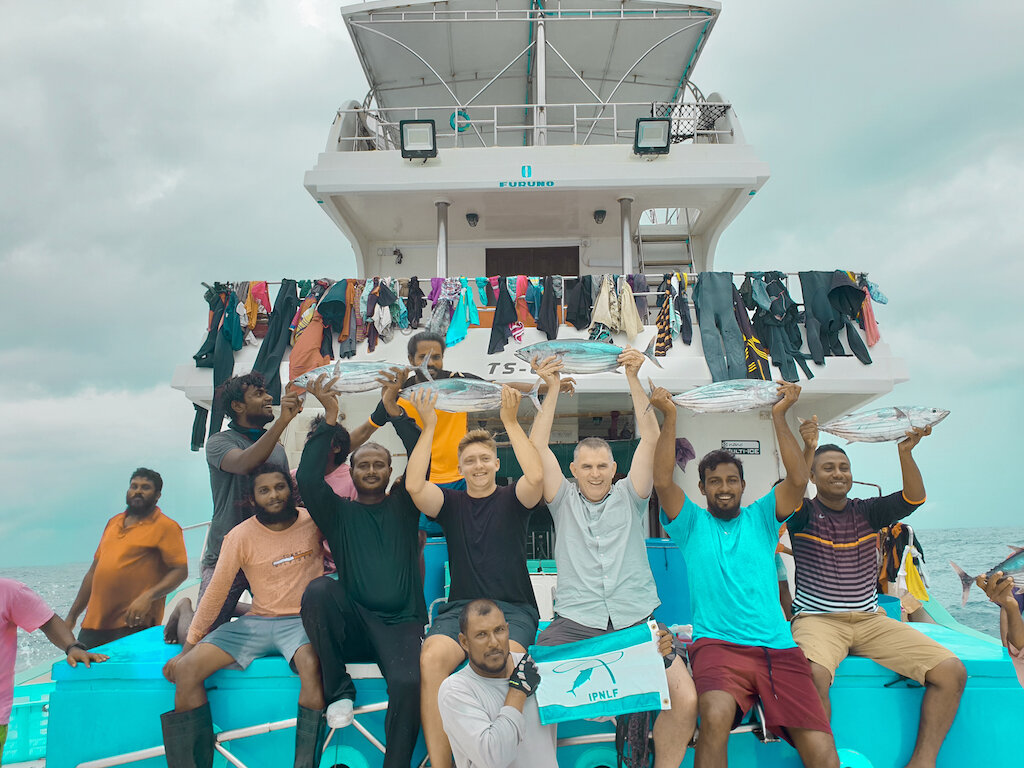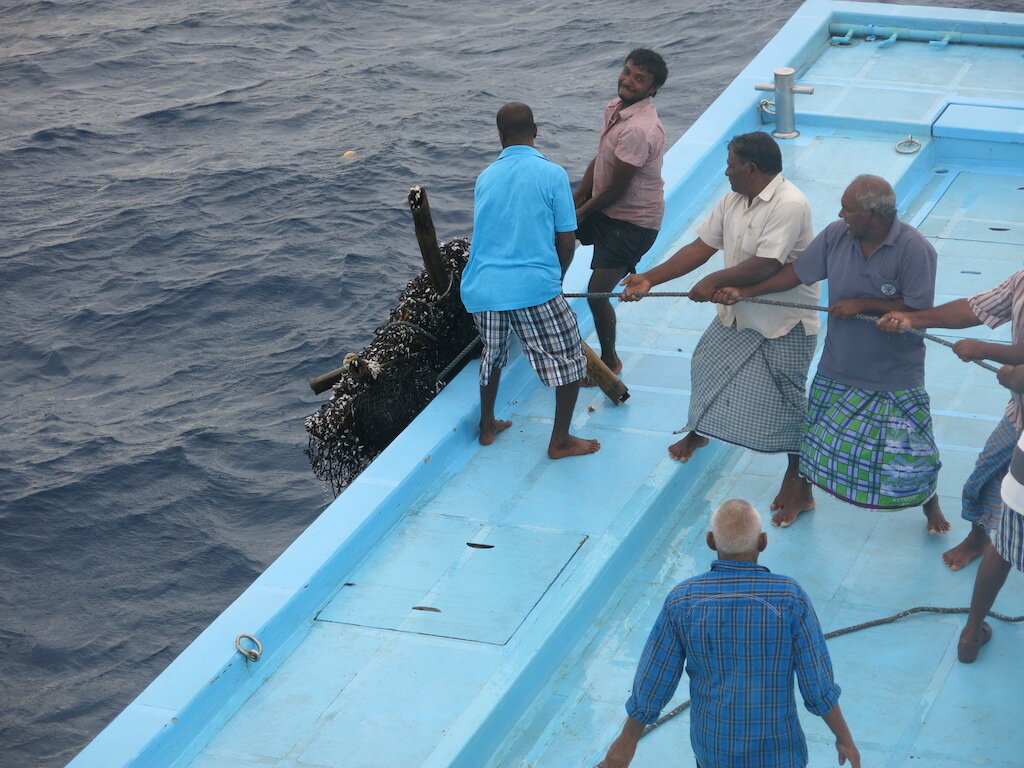The International Pole and Line Foundation
Emily Wardrop
Overfishing is an integral factor in declining ocean fish stocks and plastic pollution. However, not all fisheries contribute to this global catastrophe and the International Pole and Line Foundation strives to communicate the environmental and social responsibility of small-scale, one-by-one tuna fisheries around the world.
The International Pole and Line Foundation (IPNLF) strives to promote global environmentally and socially responsible one-by-one tuna fisheries. An international charity registered in the UK, IPNLF works across science and policy to contribute to thriving coastal fisheries and communities. With a team of staff that span the globe from the UK, Indonesia, South Africa, the Maldives, and the US, IPNLF aims to demonstrate the value of small-scale tuna fisheries.
Zacari Edwards is the current Socio-Economic Manager at IPNLF and we caught up with him to discuss, in more detail, the importance of one-by-one fisheries and the work that IPNLF does.
Fishers and IPNLF staff on board a pole-and-line fishing boat in the Maldives. Photo: IPNLF.
Hi Zac, can you tell us a little bit about the work that IPNLF does?
The International Pole & Line Foundation (IPNLF) operates across the globe with 21 staff members based in over 13 different countries. Our partners & fisheries extend to all continents except for the Arctics and our IPNLF members are found on every level of tuna supply chains.
We work with premium sustainable local fisheries that catch tuna with “one hook, one line, one fish at a time”, what we term as one-by-one fishing. One-by-one is a collective term that incorporates pole-and-line, handline, and troll line fishing techniques. This way of fishing is very selective and is both environmentally sustainable and socially responsible. It is important to note that one-by-one tuna fishing is a traditional way of fishing that has been practiced for hundreds of years by many coastal communities throughout the world. The technique is passed down from generation to generation, bringing families together through fishing.
IPNLF works to develop, support and promote one-by-one fisheries in the market, on the water and within policy forums. Our work within international decision making with governments and important stakeholders makes sure we press for healthy stock management, appropriate quotas and protective policies to help preserve marine ecosystems and biodiversity.
What sets us apart as an NGO is that we connect commercial companies to local coastal fishers, ensuring and promoting their participation in the marketplace. As a result, we are actively engaged at all levels of the supply chain - from supporting fisheries on the ground to collaborating with responsible brands and retailers where you can buy one-by-one caught tuna, such as Marks & Spencer’s and Sainsbury’s. We also collaborate closely with other types of organisations such as governments, fisher associations, and other NGOs.
What the International Pole and Line Foundation do.
What is your role within the IPNLF?
As IPNLFs Socio-Economic Manager my main responsibility is to ensure that IPNLF continue to effectively evidence the social and economic benefits of one-by-one fisheries. This involves a variety of work such as coordinating research efforts on the ground to collect social and economic data, sourcing funding to support socially focused fisheries development projects, and working closely with our communication team on how to best give a positive platform to the socially responsible fisheries we work with.
I also represent IPNLF as a coordinator for the Global Ghost Gear Initiative (GGGI), aiming to help highlight, counteract, and prevent the issue of plastic pollution from fishing vessels in the form of discarded fishing gears. Lost, abandoned or discarded fishing nets are the single most deadly form of ocean plastic pollution, and in response IPNLF are piloting various projects to incentivise and teach fishers to collect fishing nets that they encounter at sea.
How did you get into the fisheries industry?
My entry point for working in the fisheries industry started at a research level. I studied International Development and Environmental Science at the University of East Anglia, before completing an MSc degree in International Development and Sustainable Fisheries Management at Wageningen University in The Netherlands. Both degrees required me to conduct primary field research in South East Asia and allowed me to work closely with small-scale fishing communities, working for almost a year based in fishing ports operating in Indonesia. During this time, I also worked with several grassroots NGOs, and this array of practical experiences all helped naturally lead towards a role with an environmentally and socially focused NGO such as IPNLF.
What does a day working for INPLF look like?
Obviously, with lockdown in the UK, a lot of the work completed on a day-to-day level is remote and through virtual communications. However, prior to lockdown, this job has involved travelling to different countries to participate in conferences, assist in fisheries management processes or to connect with international IPNLF fisheries members.
I have been fortunate enough to spend time in both the Azores and the Maldives. Both were exceptional experiences and allowed a real insight into seeing the life of the fishers that we work so hard to promote. Not only do these trips highlight how our work can directly impact the lives of these communities, but also show how hard their jobs as fishers are.
What threats are tuna fisheries facing today?
First and foremost, one threat to the industry that’s probably on everyone’s radar at the moment, is overfishing. There simply needs to be better management regarding destructive fishing methods and responsible stock management.
Overfishing is a huge problem, however there is hope. The message that IPNLF wants to spread to the public is that there are these traditional fisheries that are environmentally sustainable and socially responsible. They work in harmony with the ocean, allowing stocks to rebuild and giving back to their community, so you do not have to cut all seafood out of your diet!
We dedicate so much time to lobbying for these sustainable lifestyles from our traditional fisheries - as always, the issue is far more complicated than what it looks like from the surface.
What threats do tuna fisheries face?
How important are one-by-one fisheries for sustainability?
One-by-one fisheries are incredibly important for both the coastal communities that they underpin and the long-term health of our ocean. From an environmental point of view, one-by-one fishing methods are what we would describe as low input methods, selectively catching tuna species at sustainable rates and allowing fish stocks to recover. One-by-one fisheries also have almost no interactions with ETP species in a significant way. This is completely different to industrial fisheries, such as gill nets or purse seine nets from commercial vessels that cannot be as selective, and as a result can catch a wide range of species of sharks, dolphins and turtles.
There is also a myriad of social benefits associated with one-by-one fisheries. One-by-one fishing requires more fishers per tonne catch than other tuna fishing methods. This labour-intensive nature of one-by-one fishing means that income derived from fishing activities is spread across crews in a more equitable manner. One-by-one fisheries also use catch-share systems in many cases, and this means that every fisher on the boat receives a share of the total catch of the fish. Crew members are therefore in essence a part of an onboard cooperative that all have a personal incentive to work as hard as possible to maximise their economic share of the catch. This also means that when you buy one-by-one products more money goes to the fishing crew compared to alternative tuna products.
How socially responsible are one-by-one (pole and line) fisheries?
Do you work with other fisheries or conservation organisations, to support the work IPNLF is doing?
An important NGO that IPNLF works with is the Olive Ridley Project, who are key partners working on our World Animal Protection’s Joanna Toole Ghost Gear Solutions Award. Our Ghost Gear Retrieval Project, in which IPNLF incentivises local fishermen to extract lost and abandoned fishing gear they encounter has been vital for highlighting the importance of making industrial fisheries more accountable for the lost, abandoned or discarded fishing nets they pollute into the ocean. Unfortunately, such nets float into Maldivian water and entangle Olive Ridley Turtles in particular. IPNLF and the Olive Ridley project work together in the Maldives with one-by-one fishers to help disentangle and safely release turtles that have been caught in industrial fishing nets. Our project has already seen fishers manage to remove massive fishing nets and safely release entangled turtles. These are on our social media pages and the wider IPNLF community has responded very positively to the project results. We are also focusing more on finding appropriate circular economy solutions and up-cycling these collected nets, ‘reusing’ the materials collected to create new products altogether.
Pole and line fishers retrieving a discarded fish aggregating device from the Maldives. Photo: IPNLF.
What are you currently working on with IPNLF?
IPNLF is really trying to reach consumers more, and it is a huge task! My main project at IPNLF that aims to help us achieve this is our new Sourcing Transparency Platform (STP). The STP will in effect be an encyclopaedia of all the fisheries that we work with globally, as well as our commercial suppliers and retailers that are part of the IPNLF membership network.
The STP will be a great tool and a huge source of data that will tell consumers about organisations near you that sell these one-by-one tuna products, and also show consumers the world of one-by-one and actually experience the type of fishery that your tuna comes from.
We want to give consumers the tools to learn for themselves why this is sustainable tuna, and this resource will empower you to find out about where your product comes from. You can learn about why these fisheries are both environmentally and socially sustainable and read more about the coastal communities that rely on our one-by-one fisheries. So, keep an eye out for the STP launch later this year!
If you’ve enjoyed this interview with Zacari Edwards, follow @IPNLF on Instagram, Twitter, and Facebook, and check out their website.
Want to be interviewed for us? Check out our ‘Get Involved’ section.


